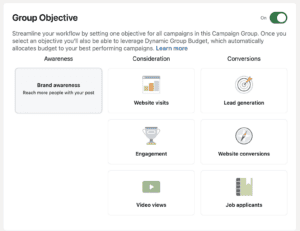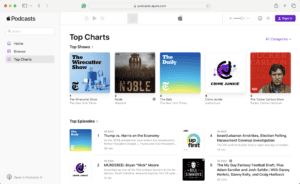Podcast guest appearances are an incredibly underutilized, yet powerful channel for lead generation.
In the past year, I have been on a few dozen podcasts. Not because I like the sound of my own voice, but because I have seen how it can drive web traffic and earn new customers for a business.
In particular, being a guest on a podcast (also sometimes referred to as “guest podcasting” or “podcast guesting”) is a strategy that does not require a ton of effort, but can yield dividends.
Being a podcast guest gets you:
- Exposure to a new audience that may not be familiar with your brand
- Implicit trust from the host who vouches for you by having you on
- Measurable results
- Brand building
And, it’s not a lot of work!
In this article, I am going to break down how you can land guest spots on podcasts to generate more leads for your business.
We’ll go through:
- The mechanics of this whole process
- Prospecting podcasts
- Your pitch
- What to do on the podcast
- Promotion
Let’s get started.
How to Get On A Podcast
There are a few ways to get on a podcast:
- Wait for an invitation (not an effective strategy unless you’re already an influencer)
- Start your own podcast and do podcast swaps with your guests who also have their own podcasts (but then you gotta have your own podcast)
- Ask for an introduction from a mutual acquaintance
- Cold email outreach
In particular, I’m going to focus on #4 primarily because I have found that to be the most effective, scalable way to get on a lot of podcasts.
But, having your own podcast can also be an extremely effective lead generation channel. If you can dedicate the time to building your own podcast, offering to do a guest swap can be a very enticing offer for other podcast hosts that want to increase their audiences as well. Plus, if you have your own podcast, it suggests that you probably own good recording equipment and will be an easy guest.
Now, there are certain situations where I might ask for an introduction (e.g. if it’s an extremely popular podcast and they have a producer who books guests), but for the most part, I just do email outreach.
The strategy is very simple:
First, you find podcasts that are popular with your target audience.
Next, you get contact information for that podcast.
Then, you email them pitching to have yourself on as a guest (and/or a guest swap if you have your own podcast also), suggesting a topic related to your business’s area of expertise.
After they accept your pitch, you go on their show and talk. If it’s like nearly every other podcast, the host will include a segment asking about your business, and usually wrap up the podcast asking how people can find you online. That’s when you can drop a promo code to refer people to so they can check out your business, and you’ll know they’re from this podcast.
And after the podcast episode goes live, you can share it, tweet it, and promote it to your existing audience.
Next, let’s get into how to prospect for podcasts.
Podcast Prospecting
If your goal is lead generation, you need to be sure that the podcasts you are reaching out to are ones that your target audience is interested in.
Who’s the Right Target Audience?
A common mistake I see with podcast outreach is that people reach out to podcasts relevant to their business, ultimately reaching out to podcasts hosted by their competitors, or podcasts that are listened to by competitors.
For example, if you are an accountant that specializes in accounting for SaaS businesses and you want to generate leads, you should not reach out to accounting-focused podcasts.
Why?
Because the hosts of those podcasts are going to be other accountants.
And the audience for those podcasts, also likely to be accountants.
Those hosts will probably not want you on as a guest when it’s an area that they could also feel comfortable talking about themselves, and/or they may have already talked about in a previous episode.
And how is that going to help your business ultimately generate leads?
Instead, you should be reaching out to SaaS business-focused podcasts, where the audience consists of your ideal customers, and where the host is not an expert in your domain.
Who to Search For?
To save time, there are a few criteria you should have when evaluating podcasts.
First, make sure the podcast is active and has an episode published in the last 3 months.
There are a lot of inactive and discontinued podcasts out there. You don’t want to waste time prospecting and pitching podcasters who are going to tell you, “Yeah, thanks for reaching out, but this podcast has not had a new episode in 4 years.”
Next, make sure the podcast you are pitching is more established and has more than just a few episodes out.
Lastly, you may want to be strategic about when to reach out to certain podcasts and in what order.
You may want to start by going on some podcasts with lower listenership, getting more comfortable on podcasts, and gaining some credentials and experience.
Then, you can later pitch the heavier hitters in your space, as you have refined your pitch, become a better guest, and you can highlight your other relevant guest spots.
Prospecting Tools
There are two tools I recommend for prospecting for podcasts.
The first is called SparkToro.
SparkToro is a business intelligence tool that helps you discover what your target audience is interested in. In particular, you can search for what podcasts your target audience is listening to, and build a list of your ideal podcasts.
The next tool is Postaga. (Full disclosure, I am a founder at Postaga)
Postaga is an email outreach platform that helps you find relevant podcasters/bloggers/journalists/businesses, get their email addresses, and send them personalized outreach pitches.
For podcasting, Postaga can search for different active podcasts by your chosen keywords, then find the contact info for those podcasters, and build and send them personalized outreach pitches.
The Podcast Pitch for Lead Generation
If you want to get on a podcast, you need to show that:
- You know about the podcast and its audience
- You have an idea for an interesting topic for that audience
- You have relevant credentials to be able to speak about that topic
- You aren’t some phony
Most of these are easy enough to show.
An important one, “you aren’t some phony”, can be trickier if you have never pitched a podcast host before.
Podcasters get pitched a lot. And a lot of the pitches they get are bad.
Bad pitches are ones that just list off one’s resume, and spout clear nonsense like, “I love your podcast”.
Every podcaster has heard “I love your podcast” from people pitching to be a guest, and it comes off as insincere.
So, here is what you are going to want to do:
- Demonstrate your interest – show that you know something about the podcast (the more specific the better, like, referencing an episode)
- (And if you have your own podcast) Offer them a guest spot on your podcast, suggesting a topic for them
- If you have a notable audience, offer to recycle the podcast into various social media content pieces and share it to your followers..
- Pitch a few episode ideas for their podcast that are relevant to their target audience, and which you have expertise in
- Demonstrate your credentials relevant to the episode ideas you pitched
But, in addition to a pitch email, you should also have follow-ups ready to go.
In general, I recommend having two follow-up emails.
And the follow-ups can be pretty simple, “Hey, just wanted to follow up on this and see what you thought.”
The point of the follow-up is not to reiterate everything you said previously; it’s to get their attention so that they can review your original email.
How to Go on a Podcast and Generate Leads
The host was impressed with your pitch and invited you on.
Now what?
They will probably send you a calendar invite link to schedule a recording.
If you have never done a podcast before, I have some tips to share.
The most important one is that you need to sound good. Sound quality is important. If you sound like you are driving through a tunnel, people won’t listen. Here are some specific tips:
- You need to sound good, so get a decent microphone
- You need to sound good, so make sure you are in a quiet location when you record
- You need to sound good, so make sure your internet is good-quality (hardwired to your modem if possible)
- You need to sound good, so close and silence any apps or things that can ping or notify you
- You need to sound like you know what you are talking about, so write a bulleted outline of talking points you want to cover ahead of time
- You want to generate leads, so make sure you create a coupon / promo code for the podcaster’s audience, and share it with them (and bonus points if you have an affiliate program)
As for the content itself, the best thing I can recommend is to outline your main talking points.
If you want to really impress their audience, you will probably have talking points you want to cover. You don’t want to get lost in digressing and never return to the point you were trying to make.
And it may sound like simple advice, but, try to have fun. If you are excited when you’re on the podcast, it will come across. If it sounds like you don’t want to be there, no one’s going to be happy.
What Next?
After the recording is complete, you should ask the podcast host, “I am doing a podcast tour for our marketing efforts. Are there any other podcasters you would recommend I connect with?”
Podcasters tend to know other podcasters. If the host can provide a warm introduction or two, you now have a solid connection with other hosts. And just like that, from one podcast appearance, you can get several more.
When the podcast episode goes live, you should help spread the word about it. Promote the episode to whatever audience you have and share it around.



Comments are closed.